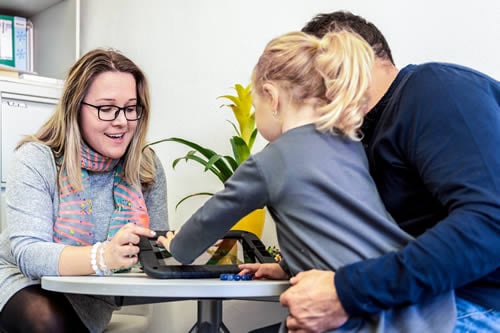October is ‘Sensory Processing Disorder Awareness Month’ – which is something of a mouthful if you don’t have your dentures in! Tongue-twisters aside, the aim of the month is to draw attention to a condition that is very common in people with special needs and to encourage greater understanding of this in the general public.
People with SPD are over or under-sensitive to stimuli affecting their:
- Vision
- Hearing
- Taste
- Smell
- Touch
- Movement
- Balance
These can all have a big knock-on effect on all aspects of their life. Each person has a unique pattern of difficulties – usually alongside other challenges such as autism, dyspraxia or physical disability.
“All of us have got some kind of sensory issue,” says Jennifer Gill, an occupational therapist who works for the NHS and also has her own, private practice. “For example, I can’t stand wet textures so I can’t have mash and gravy together. Even the thought of it makes me feel sick but I can modulate myself and get on with my daily life. But if someone’s difficulties with sensory processing are severe enough to interfere with their work, education or ability to function at home, it becomes a ‘disorder’ and they need to seek help.”
Occupational Therapists are the Experts

People with SPD are usually referred to occupational therapists although, Gill admits, many people aren’t too sure what OTs actually do. “Occupational therapy started just after the First World War,” she explains. “They used to be called ‘Basket Weavers’ because they were helping shell-shocked soldiers recover from PTSD, and basket-making was a way of distracting them from their anxieties.”
She goes on to say that the profession grew quite quickly from there and that these days, OTs have a huge range of helpful strategies at their fingertips. The first step when assessing a child’s sensory difficulties, she says, is to visit their home or school to observe how they function in the physical world.
“For example, you might go into someone’s home and see that the child’s bedroom has very busy wallpaper and lots of posters on the wall,” Gill continues. “You watch their behaviour in that environment – if they put their hands over their eyes and become overwhelmed, they probably have visual sensitivity. If they’re sensitive to noise, you might see them put their hands over their ears and start rocking. It’s like being a detective!”
SPD is a Spectrum

Depending on the young person’s needs, the OT may advise adjusting the physical environment or suggest a bespoke sensory ‘diet’ – a selection of activities that stimulate or soothe the child’s nervous system. These could be high-energy tasks, such as running or climbing, or activities using fine-motor skills such as plaiting pieces of wool or blowing bubbles. Specialist equipment such as weighted blankets or stress balls may also be recommended.
“It’s safe to assume that most kids with special needs have some kind of sensory processing issues,” Gill comments, “but it’s a spectrum so this can be anything from very mild to extreme. One of the most severe cases of SPD I have ever worked with was a young lad who used to lie across his parents’ lap and hang upside down, swinging his head,” she continues. “He needed that constant motion. We had to devise a sensory diet which provided that sensory input so we could get him to engage with learning.”
Working Alongside Families

Gill started out training as a nurse but switched to occupational therapy when she discovered it would offer more hands-on, patient involvement. “I love my work,” she says. “Some people have this idea that we just make people cups of tea but there’s so much more to OT. Everything we do is about helping that person’s mental and physical health. Building a relationship with the patients is so important.”
She warns that there are currently long waiting lists for NHS occupational therapy in many parts of the UK but says there is plenty of free advice online for families looking to help their child while they wait. She also recommends that parents keep a diary of their child’s behaviour so that when an appointment comes up, they can provide a full picture of any difficulties.
“Parents are a really important part of the assessment process,” she points out. “They usually know their child’s sensory difficulties very well and have already worked out what the triggers are.”




